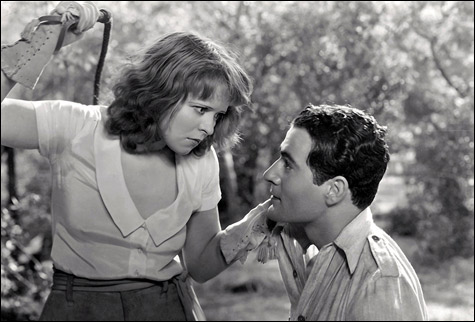
HURT ME! Clara Bow is a feisty Western heiress in Call Her Savage. |
The fleeting few years between the very early talkies (1927-’29) and the institution of Hollywood’s self-imposed censorship in the form of the Production Code in 1934 produced some of the liveliest and most adult entertainment in the history of the movie industry. Nothing remotely like it would be seen again until the Code finally fell apart in the ’60s, exhausted by repeated challenges from filmmakers. Inspired by Brandeis film-studies professor Thomas Doherty’s new book, Hollywood Censor: Joseph I. Breen and the Production Code Administration, “Vice vs. Virtue in Pre-Code Hollywood,” at the Harvard Film Archive this weekend, is the latest entertaining series to pay tribute to this fascinating era. (Doherty will be on hand this Friday evening to introduce the first two pictures.)
All 10 of the pictures in the collection were released between 1932 and 1934, and they address the tension between virtue and vice in strikingly different ways. In the brisk, evocative EMPLOYEES’ ENTRANCE (January 21 at 7 pm), the ruthless manager (Warren William) of a Manhattan department store struggling to stay solvent during the Depression takes pity on a young woman (Loretta Young) he discovers camping out in the model-homes department after closing time. He offers her a job modeling women’s clothes, but his generosity comes at a price: she has to sleep with him. In BLOOD MONEY (January 18 at 7 pm, with Call Her Savage), the hero (George Bancroft) is a bail bondsman named Bill Bailey — he hands out his own special brand of cigars with the imprinted motto “Bailey for Bail” — with a wide popularity in the underworld. But though he has a scandal in his past (he was thrown off the police force for accepting graft), Bailey conducts his affairs according to a strict code of honor. Played by the ebullient Clara Bow in her penultimate film, Nasa “Dynamite” Springer, the heroine of CALL HER SAVAGE, is a feisty Western heiress who resists the efforts of her disdainful, icy father (Willard Robertson) to control her — he wants to marry her off to a man she doesn’t love. But underneath her fiery temper and wild behavior is a woman of sensitive impulses chafing against a world in which she hasn’t yet found her place. Although Nasa’s escapades lead her into some unusual corners — in one scene a high-society escort takes her to a Greenwich Village club where men perform in drag and an anarchist (Mischa Auer) who recognizes her date as a millionaire’s son tosses food at them — the movie is careful never to show her engaged in anything truly illicit. Desperation — a sick baby — almost drives her to the streets, but circumstances conspire to keep her virtue intact.

William Wellman’s WILD BOYS OF THE ROAD (January 20 at 3 pm, with Two Seconds) is a traditional loss-of-innocence story about teenagers forced onto the road by poverty, and though it has a reputation for reflecting its time, in fact it’s governed by a sentimental naïveté. (Wellman’s Heroes for Sale, from the same period, is a tougher and more harrowing depiction of the horrors of the Depression.) The movie comes alive only briefly, during its famous freight-hopping sequence. At the other end of the spectrum are THE SIGN OF THE CROSS and KONGO (January 20 at 7 pm), two of the most lurid melodramas of the early ’30s. In the first, one of Cecil B. DeMille’s trademark Biblical epics, vice is represented by the Emperor Nero (Charles Laughton, lolling on his throne like a contented pussycat), his lusty wife, Poppæa (Claudette Colbert, first glimpsed in a bath of asses’ milk), and the decadent Roman aristocracy, always on the lookout for the latest sensual pleasures. Virtue is embodied in the clandestine, hunted community of Christians, who are eventually rounded up and fed to the lions. DeMille was an old-fashioned snake-oil drummer who sold virtue to his audiences only after luring them in with as much photogenic vice as he could pack into two hours, so you can’t complain that his phony sermons are dull. The Sign of the Cross, with its 1932 banalities stuffed into the mouths of tunic-clad Romans, is rather a delirious experience that contains one of the weirdest sequences in any pre-Code picture: a long-legged, eye-popping performer called Joyzelle executes the sinuous “dance of the naked moon” in an effort to melt the frigid resistance of the Christian heroine (Elissa Landi), but she can’t concentrate when she hears the hymn of the passing Christians en route to the arena dungeon.